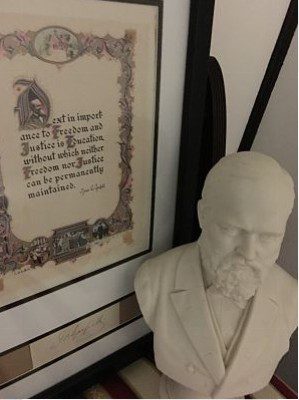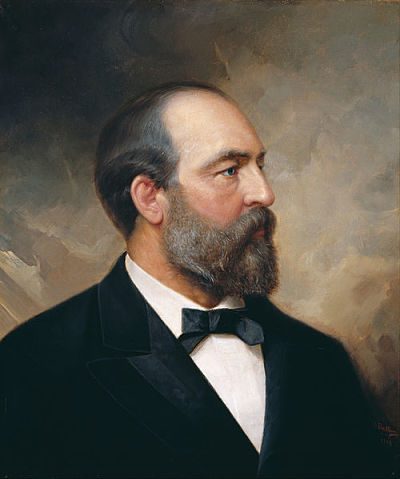
When a country needs advice, turning to a hero is a good idea. When a Party faces tough times, then looking to a man who died in service to that party is a superb one.
Listen to James Garfield.
“Who?” I can hear people ask.
Most people my age think of a cartoon cat when they hear “Garfield,” my college students often haven’t even heard of the cat. Nobody much pays attention to James Garfield, the hero. That’s too bad, because he has a good bit to say and for any American, though especially for any Republican, General Garfield earned the right to be heard.
His family was poor, even by Abraham Lincoln standards. He worked any job, including the most menial, in order to eat. Garfield loved education, but education was hard to get so he read the Bible and kept working. Jesus and Christianity would shape his character: leading him to ministry. Simultaneously, Garfield managed to get a classical education and become a college president. If that was not accomplishment enough, he fought slavery, blasting a rebellion that tried to end the Union, and served the nation with distinction as a Congressman and briefly as President. He was nominated by a Republican Party that wanted to win a Presidential election, but not at the cost of more graft and corruption.
James Garfield was shot by a madman and died a horrible death of infection due to grossly incompetent medical care. He did not have time to accomplish much as President, but his life as a mostly honorable man who got (most) of the big decisions of his life right . . . doing well by doing good . . .was and should remain an inspiration to the Party he helped create and loved, the Grand Old Party, the Republican Party.
What is his message?
“This public life is a weary, wearing one, that leaves one but little time for that quiet reflection which is necessary to keep up a growth and vigor of Christian character. But I hope I have lost none of my desire to be a true man, and keep ever before me the character of the Nazarene.”
There has never been a time when party politicians did not suggest to such men that they needed to cut ethical corners to govern. “Dishonor yourself that good may come.” The dishonor is certain, the good never comes.
But isn’t dishonor necessary?
President Garfield responds as any Christian and most classicists would:
The people of the United States can afford to make any sacrifice for their country, and the history of the last war is proof of their willingness; but the humblest citizen cannot afford to do a mean or dishonorable thing to save even our glorious Republic.
James Garfield, Republican, who was willing to die to save the Union, would not advise a single voter to dishonor to save the Union.
The “last war” was the Civil War and Garfield was a man willing to fight to end slavery and who had heroically risked his life to carry out his duty in that War. James Garfield had courage and so when he says we cannot “afford to do a mean and dishonorable thing,” he was not speaking out of fear. He also knew what it was to make wrong choices, especially in his marriage, and to repent of those choices. He knew the rewards of honor and the cost of dishonorable deeds. This is vital, because he had seen the worst of men in the War, and the worst of himself in private life, and repented.
 He gave his life in service to cleaner politics than were common in his time. When he (mostly) refused the corner cutting, the deals, and the payola so common in the Gilded Age, he did so because he had made mistakes and knew their cost. He did not hate wealth and valued security as only a person born in great poverty does.
He gave his life in service to cleaner politics than were common in his time. When he (mostly) refused the corner cutting, the deals, and the payola so common in the Gilded Age, he did so because he had made mistakes and knew their cost. He did not hate wealth and valued security as only a person born in great poverty does.
Don’t we have to lie? After all the other side, those Rebels, are very bad and they might win. Garfield:
“It is never right to lie or manly to lie, even about Satan.”
He was a winner in life, at everything he ever tried, but he knew the worth of that winning. Nobody should do a “mean or dishonorable thing” even to save the Republic. Any honorable action for a noble cause, but not one dishonorable act for even the greatest causes.
Christianity taught this devout man in politics, whose piety poured from his very pores, that bad means are never justified by hoped for good ends. Classical reading put the fear of tyranny, the temptation that makes good men do very bad things, in his soul.
His own sins showed him the truth of both ideas.
Christian and classical politics, Republican politics, at their best are Party over personal needs, country over Party, and Christ over country every time. Garfield saw his country’s wrongs and was willing her wrongs to right. Of course, Garfield was imperfect, and not just in areas where he knew his faults. He would agree with that assessment, because as a Christian he knew his faults were surely greater than he knew. Garfield would have asked for mercy and he would have deserved it, because James Garfield was willing to repent, be sorry and change. He aspired to goodness more than power, though he hoped to do good with power if he got it.
His aspirations were better than he was, but do not discount dreams. His dreams of education got Garfield to college. His dreams of ending slavery got him a hero’s chance to shine. His dreams for the nation made him President. His dream of being like Jesus made him a better man every decade of his life.
He grew unwilling to dishonor himself or ask others to dishonor themselves in a temporal cause, because the Kingdom was coming. James Garfield was a citizen in the Republic and a subject of the Kingdom of God who put the command of the Sovereign God, love even your enemies (including the rebels, God help them) over the short term needs of the Republic.
After all, the old war hero said: “I would rather be beaten in Right, than succeed in Wrong.”
I may not succeed, certainly not like Garfield, and I have (God have mercy) been wrong, but may I die in and for the Right.
Victory is worth nothing except for the fruits that are under it, in it, and above it.












